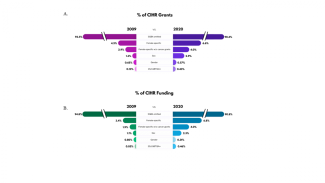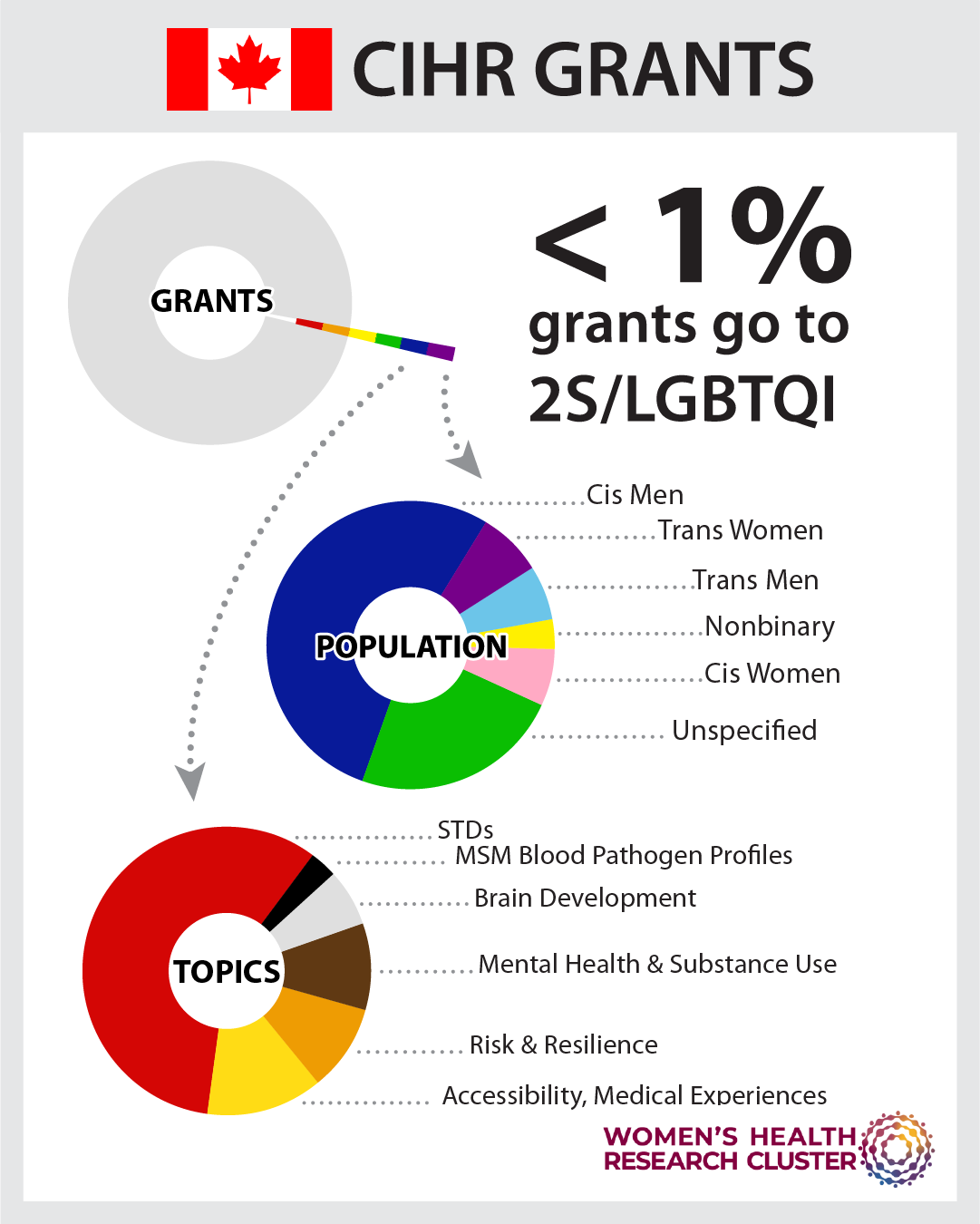Sex and gender impact disease risk, manifestation, and outcomes in a variety of ways. However, females were excluded from clinical and pre-clinical studies for decades due to concerns over reproductive harm in humans and “complicated” hormone cycles in animals. This exclusion has resulted in a significant gap in our knowledge of health and disease in women and gender diverse individuals.
In addition to the research conducted by our members, the WHRC does it's own research to help us facilitate deeper integration of sex and gender-based anlysis. Click below and check back soon for more information on these projects.
Assessing SGBA Adoption in CIHR-Funded Research
Background: To bridge the sex and gender health gap, the Canadian Institutes of Health Research (CIHR)—the primary funding body for health research in Canada—mandated the adoption of Sex- and Gender-Based Analysis (SGBA) in research methodology. Thus, researchers applying for funding are now required to discuss how sex and/or gender play a role in their research, and how they plan to analyze these variables.
Research Project: We examined whether CIHR’s changing policies around SGBA increased the mentioning of sex or gender, female-specific health, or 2S/LGBTQIA+ health in the abstracts of successful CIHR grant applications from 2009-2020.
Findings: We found that less than 3% of funded research abstracts mentioned sex or gender, less than 6% investigated female-specific outcomes, and just 0.35% focused on the 2S/LGBTQIA+ community. Funded proposal abstracts mentioning sex or 2S/LGBTQIA+ health increased slightly over time, whereas abstracts mentioning gender or female-specific health did not change. The percentages of overall funding allocated for sex, gender, female-specific health, and 2S/LGBTQIA+ health research largely mirrored these trends. Our results suggest that more work needs to be done to increase the adoption of SGBA in health research. Individual researchers, funding agencies, and publishers all play in integral role in closing the women’s health knowledge gap and advancing equity in health research.
Read our Work:
- Academic article-Are we moving the dial? Canadian health research funding trends for women’s health, 2S/LGBTQ + health, sex, or gender considerations (2023)
- Blog post-An Honest Look into Sex & Gender Health Research in Canada (2023)

Examining 2S/LGBTQ + Research Funded by the CIHR
Background: Gender identity and sexual orientation are essential factors that must be incorporated into health research to ensure we unearth comprehensive and inclusive insights about the healthcare needs and experiences of diverse people. Despite the calls for more focus on sex and gender in health research, scant attention has been paid to gender identity or sexual orientation. Past research found that 0.35% of Canadian Institutes of Health Research (CIHR) grant abstracts mentioned studying lesbian, gay, bisexual, transgender, queer and/or Two-Spirit (2S/LGBTQ+)-specific health outcomes. However, the nature of that research was not explored.
Research Project: We explored the funding areas for health research specific to Two-Spirit, lesbian, gay, bisexual, transgender, queer or questioning, and intersex (2S/LGBTQI) individuals, as funded by the Canadian Institutes of Health Research (CIHR), based on the grant abstracts. We analyzed the publicly available database of grant abstracts funded by CIHR from 2009–2020 to examine what types of 2S/LGBTQI-specific health outcomes would be studied and in what populations.
Findings: We found that 58% of awarded grant abstracts mentioned studying sexually transmitted diseases, the majority of which was on human immunodeficiency virus. Of the funded 2S/LGBTQI grant abstracts that specified the gender of the population to be studied (n=23), less then 9% mentioned studying cisgender women. Almost 40% mentioned including trans women/girls, and 30% mentioned including trans men/boys. None of the studies examined mentioned work with the Two-Spirit community.
Read our Work:
- Academic article-Canadian health research funding patterns for sexual and gender minority populations reflect exclusion of women (2024)
- Pre-print-Canadian health research funding patterns for sexual and gender minority populations reflect exclusion of women (2024)
